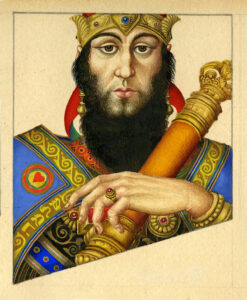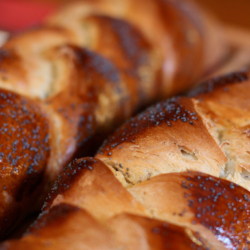Not deferring to the wealthy or overfavoring the poor is a requirement articulated in the Ḳedoshim code (Leviticus 19:15). The reference to the ship, which compares Eyshet Ḥayil to “merchant ships/she brings food from afar” now glosses on the acts of the pious sailors in the book of Jonah who, rather than throw the prophet overboard as he requests, discard their cargo and continue to row to save his life.
A Man of Value’s closing couplet is comprised of two quotes. This is an Arabic poetic technique called the kharja, which was employed by the medieval Hebrew poets of the Golden Age of Spain. I have combined the words of U.S. civil rights leader and representative Elijah Cummings “I’m here for a season and a reason. I don’t know why I’m here, I don’t know how long I’ll be here, but I’m here. And I’m going to make the best of it” which was quoted by the Baltimore Sun, his hometown paper, at the time of his death in 2019. The more famous line “We make the road by walking” comes from Spanish writer Antonio Machado in Campos de Castilla. “Caminante, son tus huellas el camino, y nada más; caminante, no hay camino, se hace camino al andar. Al andar se hace camino, y al volver la vista atrás se ve la senda que nunca se ha de volver a pisar. Caminante, no hay camino, sino estelas en la mar.”[1] From the poem, “Caminante no hay Camino” (“Wayfarer, there is no path”). This poem can be found in Antonio Machado’s collection Proverbios y Cantares (Proverbs and Song). (“Wayfarer, the only way / Is your footprints and no other. / Wayfarer, there is no way. / Make your way by going farther. / By going farther, make your way / Till looking back at where you’ve wandered, / You look back on that path you may / Not set foot on from now onward. / Wayfarer, there is no way; / Only wake-trails on the waters.”)
| Contribute a translation | Source (English) |
|---|---|
A man of value cannot be appraised, his worth is an incalculable treasure. He rejoices in sunlight when he rises, and at night he blesses the dark. A pillar of his household, he does not make himself a pedestal. He puts down the gun and lowers his shield and comforts the crying child. He stands in equanimity before all without deference to wealth or favor to the poor — he is truthful in all his dealings. When the winds of challenge buffet his ship he shifts his sails and lightens the cargo and continues to navigate calm waters. His community praises his intention his family rests in his esteem. I’m here for a season and reason, he says I will make the road by walking. |
Notes
| 1 | From the poem, “Caminante no hay Camino” (“Wayfarer, there is no path”). This poem can be found in Antonio Machado’s collection Proverbios y Cantares (Proverbs and Song). |
|---|

“A Man of Value, by Debra Cash” is shared through the Open Siddur Project with a Creative Commons Attribution-ShareAlike 4.0 International copyleft license.










Leave a Reply